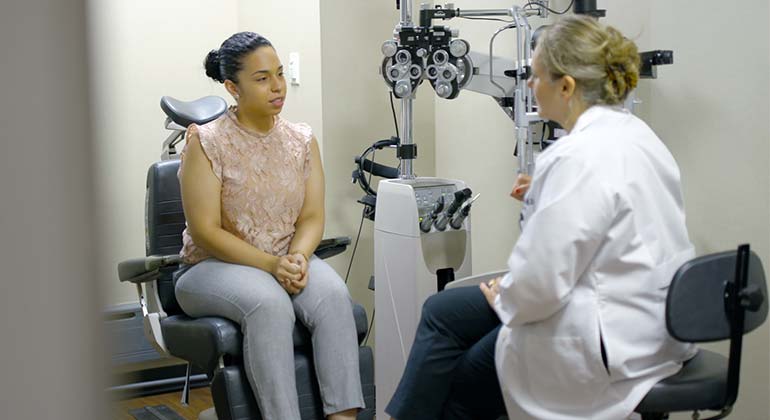Discover a Neurologist in Andalusia: Specialized Clinics and Care Providers
Discover a Neurologist in Andalusia: Specialized Clinics and Care Providers
Blog Article
Browsing the Puzzle of Refractive Surgeries: Which Procedure Is Right for You?
In the realm of refractive surgical treatments intended at correcting vision, the selection of available treatments can usually appear like a labyrinth, each guaranteeing to provide quality and accuracy. As individuals ponder beginning on the trip in the direction of more clear sight, the important inquiry occurs: which procedure is without a doubt the most appropriate choice?
Comprehending Refractive Surgery Options

Variables to Take Into Consideration Before Picking
Choosing the most ideal refractive surgical procedure requires a complete evaluation of various elements to guarantee optimal results for each individual. Prior to selecting a procedure, several crucial considerations must be taken into account.
Individuals with energetic lifestyles or certain job-related requirements might profit extra from certain treatments. People entailed in contact sporting activities might opt for procedures like PRK over LASIK due to the reduced threat of flap difficulties.
Comparing Popular Vision Adjustment Procedures
Taking into consideration the various aspects that influence the selection of a refractive surgical treatment, it is crucial to compare prominent vision adjustment procedures to figure out one of the most appropriate alternative for individual needs. Two widely known procedures are LASIK (Laser-Assisted sitting Keratomileusis) and PRK (Photorefractive Keratectomy)
LASIK involves producing a thin flap on the cornea, improving the underlying tissue with a laser, and afterwards rearranging the flap. It provides quick healing and very little pain, with the majority of people experiencing enhanced vision nearly right away. On the various other hand, PRK includes eliminating the external layer of the cornea prior to improving it with a laser. The recovery duration is longer contrasted to LASIK, PRK is a far better option for people with slim corneas or specific corneal irregularities.
When comparing these treatments, variables like corneal thickness, eye health, and preferred healing time need to be carefully considered. Consulting with a seasoned ophthalmologist is necessary to establish one of the most ideal treatment based upon a person's details needs and eye health and wellness condition.
Personalized Treatments for Private Requirements
Customizing refractive surgical procedures to fulfill one-of-a-kind individual demands is vital in achieving optimal aesthetic results and complete satisfaction rates. Customized therapies think about individual variables such as prescription toughness, corneal thickness, student dimension, and lifestyle factors to consider to establish one of the most suitable treatment for every patient. Advanced modern technologies like wavefront-optimized or wavefront-guided treatments make it possible for doctors to attend to higher-order aberrations and enhance visual high quality past what conventional treatments can supply.

Locating the Right Specialist for You
When seeking a specialist for refractive surgery, it is crucial to prioritize knowledge and experience in the area. The specialist you choose will play a substantial function in the success of your treatment and the outcome of your vision. To locate the best doctor for you, think about variables such as their certifications, field of expertise in refractive surgeries, and the variety of treatments they have done.
Begin by researching prospective doctors and their credentials. Try to find eye doctors who are board-certified and have particular training in refractive surgical procedure. In addition, review individual endorsements and before-and-after pictures to assess the doctor's record of successful results.
Throughout appointments, inquire about the cosmetic surgeon's experience with the certain treatment you are taking into consideration. Ask about their problem rates, success rates, and exactly how they manage any kind of possible threats associated with the surgery. A knowledgeable and proficient doctor will certainly not just have the technological expertise yet additionally the capability to personalize the treatment to your private requirements, guaranteeing the finest possible results for your vision correction trip.
Verdict
In verdict, when thinking about refractive surgeries, it is vital to understand the readily available choices, variables to take into consideration, and the distinctions between popular treatments. Finding a knowledgeable specialist that can direct you via the labyrinth of choices is vital in neurologist Andalusia ensuring a successful vision correction treatment.
In the world of refractive surgical treatments aimed at dealing with vision, the range of readily available procedures can typically appear like a labyrinth, each guaranteeing to supply clarity and precision. One usual procedure is LASIK (Laser-Assisted in Situ Keratomileusis), where a laser reshapes the cornea to deal with refractive errors such as farsightedness, nearsightedness, and astigmatism. Custom-made therapies take into account individual factors such as prescription stamina, corneal thickness, student size, and lifestyle considerations to figure out the most suitable procedure for each person. To find the ideal cosmetic surgeon for you, consider factors such as their qualifications, specialization in refractive surgeries, and the number of procedures they have actually done.
In final thought, when thinking about refractive surgical treatments, it is crucial to comprehend the readily available alternatives, elements to think about, and the distinctions in between popular treatments. - eye doctors in andalusia
Report this page